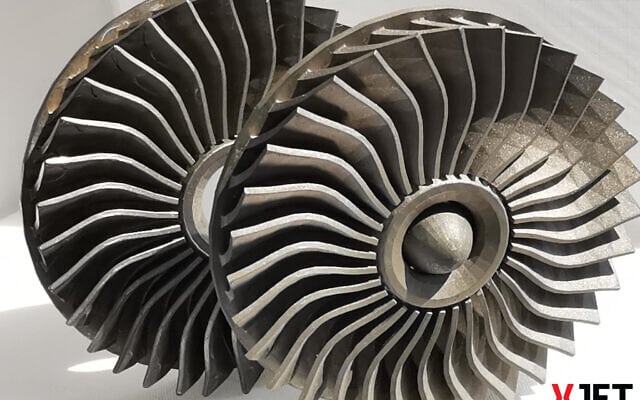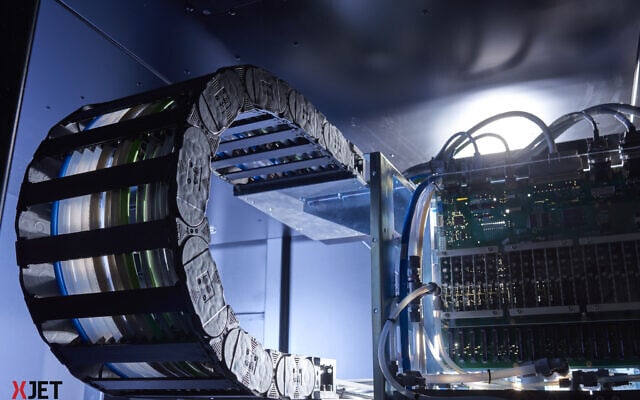Developer of inkjet technology for 3D printing of small metal and ceramic parts plans to offer 2 million shares as part of the initial public offering
Israel’s XJet, which develops inkjet technology for 3D printing of small metal and ceramic parts, is seeking to raise about $10 million from an initial public offering (IPO) of shares on the Nasdaq.
Rehovot-based XJet plans to offer 2 million shares at a price of $4 to $6 per share, according to a preliminary prospectus filed with the US Securities and Exchange Commission (SEC) on May 25. The shares are expected to be traded on the Nasdaq Global Market under the symbol XJET in coming weeks following the completion of the roadshow and the IPO process.
“Despite market conditions, we believe going public is the best platform for us to access capital and to scale up the company as our products are ready,” XJet CEO Yair Alcobi told The Times of Israel.
XJet’s technology seeks to enable manufacturers to print small ceramic or metal parts with the ease and versatility of printing a document on an inkjet printer but with mass scale. The startup has developed a liquid ink based on nanoparticles of raw materials to create customized parts using its 3D printing technology.
Its patented technology is based on a so-called nanoparticles jetting (NPJ) process that uses inkjet printing technology to create extremely thin layers of ceramics or metal material. The NPJ ink is stored and delivered in sealed cartridges and inserted into its printers in an automated process.
XJet says its technology enables the production of “geometrically complex and high-quality metal and ceramic end-use parts that are otherwise difficult or impossible to produce.”

“Most of the technologies today require some human intervention,” Alcobi said. “XJet’s technology enables 3D printing or additive manufacturing of totally new designs with the press of a button which would be hard to create with traditional manufacturing.”
Founded in 2005 by industry veteran Hanan Gothait, XJet has raised about $100 million to date and has built a workforce of about 100 people who were previously involved in the development of Objet’s PolyJet, Indigo’s ElectroInk, and HP Scitex’s wide-format inkjet technology. Its principal shareholders are Lucion, Alumot, ARCHina, and IBI Trust Management.
Israel’s XJet, which develops inkjet technology for 3D printing of small metal and ceramic parts, is seeking to raise about $10 million from an initial public offering (IPO) of shares on the Nasdaq.
Rehovot-based XJet plans to offer 2 million shares at a price of $4 to $6 per share, according to a preliminary prospectus filed with the US Securities and Exchange Commission (SEC) on May 25. The shares are expected to be traded on the Nasdaq Global Market under the symbol XJET in coming weeks following the completion of the roadshow and the IPO process.
“Despite market conditions, we believe going public is the best platform for us to access capital and to scale up the company as our products are ready,” XJet CEO Yair Alcobi told The Times of Israel.
XJet’s technology seeks to enable manufacturers to print small ceramic or metal parts with the ease and versatility of printing a document on an inkjet printer but with mass scale. The startup has developed a liquid ink based on nanoparticles of raw materials to create customized parts using its 3D printing technology.
Its patented technology is based on a so-called nanoparticles jetting (NPJ) process that uses inkjet printing technology to create extremely thin layers of ceramics or metal material. The NPJ ink is stored and delivered in sealed cartridges and inserted into its printers in an automated process.
XJet says its technology enables the production of “geometrically complex and high-quality metal and ceramic end-use parts that are otherwise difficult or impossible to produce.”
“Most of the technologies today require some human intervention,” Alcobi said. “XJet’s technology enables 3D printing or additive manufacturing of totally new designs with the press of a button which would be hard to create with traditional manufacturing.”
Founded in 2005 by industry veteran Hanan Gothait, XJet has raised about $100 million to date and has built a workforce of about 100 people who were previously involved in the development of Objet’s PolyJet, Indigo’s ElectroInk, and HP Scitex’s wide-format inkjet technology. Its principal shareholders are Lucion, Alumot, ARCHina, and IBI Trust Management.
In the year ending Dec. 31, XJet reported revenue of $6 million, up from the $3.4 million in revenue generated in 2021, according to prospectus filing.
Alcobi said XJet will use the net proceeds of the IPO for “scaling up, sales and marketing, and for R&D manufactuting purposes.”
The global market for additive manufacturing, or 3D printing, was an estimated $13.8 billion in 2021 and is forecast to reach about $76 billion by 2030, according to a 2022 market research report by Grand View Research.
Last week, Israeli 3D printing firm Stratasys announced that it would merge with Desktop Metal, a US company, in an all-stock deal creating a combined 3D printer company valued at approximately $1.8 billion. The combined company is expected to generate $1.1 billion in revenue in 2025.
Subscribe to AM Chronicle Newsletter to stay connected: https://bit.ly/3fBZ1mP
Follow us on LinkedIn: https://bit.ly/3IjhrFq
Visit for more interesting content on additive manufacturing: https://amchronicle.com


